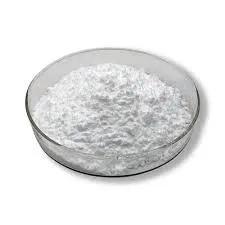
Oct . 14, 2024 12:00 Back to list
hydroxyethyl cellulose uses
Hydroxyethyl cellulose (HEC) is a versatile, water-soluble polymer derived from cellulose, extensively utilized in various industries due to its unique properties. Its non-toxic nature and biodegradability make it an attractive option for applications ranging from pharmaceuticals to construction materials.
One of the primary uses of HEC is in the formulation of personal care products. It serves as a thickening agent and stabilizer in shampoos, lotions, and creams, providing a desirable texture and enhancing the consistency of the products. Furthermore, HEC acts as a hydrating agent, which helps to improve skin moisture retention, making it a common ingredient in moisturizing formulations.
In the food industry, hydroxyethyl cellulose is employed as a food additive. Its ability to form gels and retain water can improve the texture and mouthfeel of products like sauces and dressings, giving them a smooth and creamy consistency. Additionally, HEC is used as a fat replacer in low-fat or reduced-calorie foods, which helps maintain texture while lowering fat content.
Hydroxyethyl cellulose (HEC) is a versatile, water-soluble polymer derived from cellulose, extensively utilized in various industries due to its unique properties
. Its non-toxic nature and biodegradability make it an attractive option for applications ranging from pharmaceuticals to construction materials.In the construction industry, HEC is a valuable additive in cement and mortar formulations. It enhances the workability and flow of these materials, making them easier to apply. Additionally, HEC contributes to the water retention of the mixture, which is critical for ensuring proper curing and hardening of cement-based products. Its use in joint compounds and adhesives also improves adhesion and workability.
hydroxyethyl cellulose uses

Another area where HEC finds application is in the textile industry. It is used as a sizing agent in the finishing of fabrics, providing them with a soft and smooth feel while enhancing durability. Furthermore, HEC is incorporated into dyeing processes, allowing for better dye uptake and uniform coloration.
In the realm of oil and gas, hydroxyethyl cellulose plays a crucial role as a thickening agent in drilling fluids. These fluids are essential for lubricating drill bits and transporting excavated material to the surface. The use of HEC in this context ensures optimal viscosity and performance, minimizing operational issues and improving efficiency.
Furthermore, hydroxyethyl cellulose has gained popularity in the formulation of environmentally friendly cleaning agents. Its biodegradable nature aligns with the growing consumer demand for sustainable products. HEC acts as a thickener and stabilizer in various cleaning solutions, enhancing their effectiveness and user experience.
In summary, hydroxyethyl cellulose is a multifunctional polymer with a broad spectrum of applications. From personal care products to pharmaceuticals, foods, construction, textiles, and environmental cleaning agents, HEC continues to prove its value in modern consumer and industrial markets. Its unique properties, combined with its non-toxic and biodegradable nature, ensure that hydroxyethyl cellulose will remain a pivotal ingredient across diverse sectors for years to come.
-
Versatile Hpmc Uses in Different Industries
NewsJun.19,2025
-
Redispersible Powder's Role in Enhancing Durability of Construction Products
NewsJun.19,2025
-
Hydroxyethyl Cellulose Applications Driving Green Industrial Processes
NewsJun.19,2025
-
Exploring Different Redispersible Polymer Powder
NewsJun.19,2025
-
Choosing the Right Mortar Bonding Agent
NewsJun.19,2025
-
Applications and Significance of China Hpmc in Modern Industries
NewsJun.19,2025







